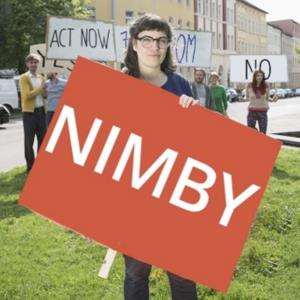Like fog, it creeps in, but unlike fog, it doesn’t dissipate. It gets denser and does untold damage to the economy and Americans’ lives.
It is that modern plague, known as much by its acronym as by its phrase: NIMBY, “not in my backyard.” It is the mantra of everyone who wants wherever they are to remain as it is — in perpetuity.
It is, in part, behind the crisis in electricity transmission, the lack of much-needed natural gas and oil pipelines, unbuilt but needed highways, and is a player in environmental injustice.
NIMBYism has also contributed to the housing crisis. It makes it so hard to build anything that disturbs the serenity of those who live in leafy suburbs with manicured lawns, and, perhaps, designer dogs. Yes, people like me — even though I can’t afford one of those homes or dogs.
If you are living the American Dream — two cars, swell house, well-tended garden — you are almost certainly a passive NIMBY contributor.
Active NIMBYs, abetted by the local ordinances that make life pleasant for the urban and suburban elites, fear that new housing will bring things they abhor: traffic, crowding, pollution and people of a different social class.
Desperately needed apartments and even mother-in-law houses or extensions are denied, contributing substantially to the national housing crisis.
It is easy to identify the effect of NIMBYism in housing. Still, it is at work countrywide, restricting, redirecting and forcing the abandonment of projects.
Power lines aren’t constructed, natural gas isn’t moved, road plans are abandoned, and unwanted facilities like prisons, factories and slaughterhouses are inflicted on poor areas, often rural, where the locals are bribed with job promises or don’t have the sophistication or resources to turn up opposition with media, litigation and political influence.
In Rhode Island, in the last several years, I have seen opposition mounted against a fish farm, offshore windmills, a medical waste disposal facility and various housing developments. “Put it somewhere else” is the collective cry.
So, the medical waste facility will go to an area where residents are less likely to object, not where it is needed, adding transportation costs; the power will be generated somewhere else, or there will be a shortfall; and Rhode Islanders, under a modified plan, may eventually get oysters farmed in the Sakonnet River.
The distorting effects of NIMBYism aren’t just an American burden. In Europe, they are as bad or worse.
For a long time, the Economist has been writing about how hidebound Britain has become by the prevalence of a culture of “don’t change anything.” The magazine has often pointed out that Britain has become a place where it is impossible to get anything done.
I can attest to that. A family member lived in a not very impressive — actually ugly — apartment block, built in the 1930s, near London.
As was done at that time to save money, all the water and sewer pipes were external, running along the walls on the outside. I mention the pipes only to point out that this building wasn’t lovely or a significant piece of English architecture. It was just a utilitarian block of flats.
Yet, local ordinances designed to preserve the historic and beautiful buildings prohibited the residents from replacing old, leaky, wood-framed windows with modern, metal-framed ones. Preservation run amok is stultifying.
Not every project — either big, like a power plant, or small, like an apartment adjoining a house for an aging relative — is right for a community. But when local selfishness transcends a national need, some revision is needed.
Certainly, industrial companies, real estate developers and utilities shouldn’t be entitled to overrule local people axiomatically. Still, when the national interest is held hostage to local preference, there is a problem.
Take the long-planned and abandoned after completion nuclear waste storage site in Yucca Mountain, Nevada. It was abandoned because of well-orchestrated opposition. Result: nuclear waste is now temporarily stored above ground, near where it is created — as much a product of NIMBYism as the housing shortage.
The British have another acronym for what happened to Yucca Mountain: DADA, “decide, announce, defend, abandon.”

 Follow
Follow
Leave a Reply